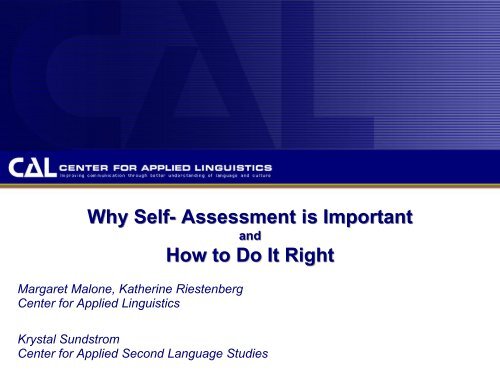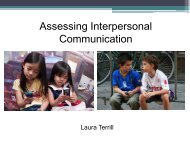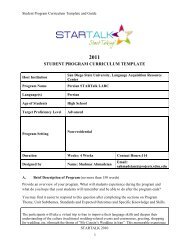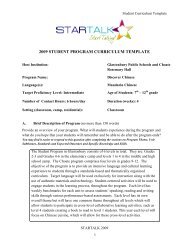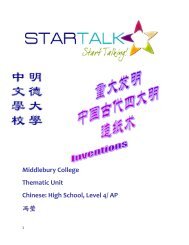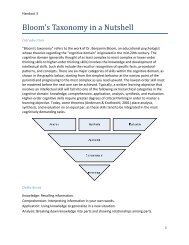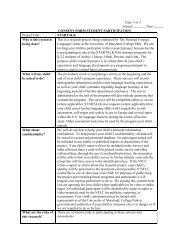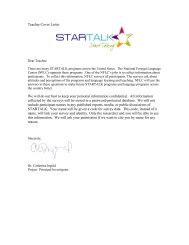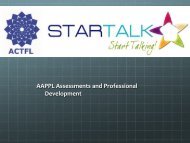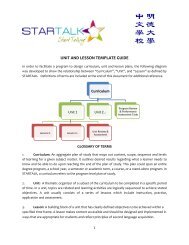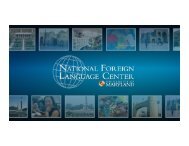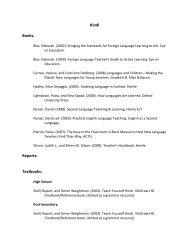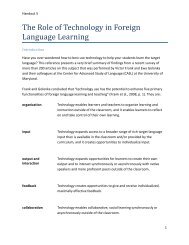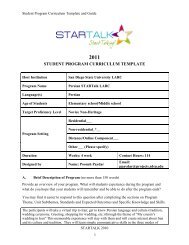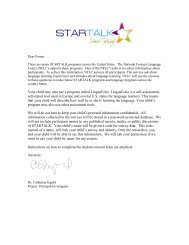Why Self- Assessment is Important How to Do It Right - StarTalk
Why Self- Assessment is Important How to Do It Right - StarTalk
Why Self- Assessment is Important How to Do It Right - StarTalk
Create successful ePaper yourself
Turn your PDF publications into a flip-book with our unique Google optimized e-Paper software.
<strong>Why</strong> <strong>Self</strong>- <strong>Assessment</strong> <strong>is</strong> <strong>Important</strong><br />
and<br />
<strong>How</strong> <strong>to</strong> <strong>Do</strong> <strong>It</strong> <strong>Right</strong><br />
Margaret Malone, Katherine Riestenberg<br />
Center for Applied Lingu<strong>is</strong>tics<br />
Krystal Sundstrom<br />
Center for Applied Second Language Studies
Purposes<br />
<strong>Why</strong> should students self-assess<br />
<strong>How</strong> do we use LinguaFolio<br />
What resources are available <strong>to</strong><br />
help me<br />
1
Reasons for student self-assessment<br />
Individual student level<br />
−Agency<br />
−Reflection<br />
Classroom level<br />
−Washback<br />
Program level<br />
−Communication<br />
−Outcomes
<strong>How</strong> can self-assessment benefit students<br />
Agency<br />
− <strong>Self</strong>-assessment puts the student in the driver’s seat!<br />
− The student has control over what s/he puts in<strong>to</strong> the<br />
assessment.<br />
− <strong>Self</strong>-assessment provides an opportunity for student<br />
empowerment
<strong>How</strong> can self-assessment benefit students<br />
Reflection<br />
Students think about:<br />
− what they have learned<br />
− how well they have learned it<br />
− how what they have learned fits <strong>to</strong>gether<br />
− where they can go from here
<strong>How</strong> can self-assessment benefit the language classroom<br />
Washback<br />
− refers <strong>to</strong> the intended or unintended results of an<br />
assessment on student behavior
Positive washback of self-assessment<br />
After reflecting, students may decide <strong>to</strong> change<br />
behavior <strong>to</strong> improve language learning<br />
Gives student a <strong>to</strong>ol <strong>to</strong> communicate with<br />
instruc<strong>to</strong>rs about learning goals<br />
Instruc<strong>to</strong>rs can work with students <strong>to</strong> reflect on<br />
what they have learned<br />
Instruc<strong>to</strong>rs have a clear indication of where<br />
students think they are in the learning process<br />
which can help focus teaching
<strong>How</strong> can self-assessment benefit the language program<br />
Communication within the program<br />
Communicating successful outcomes <strong>to</strong> funders
Communication within the program<br />
<strong>Self</strong>-assessment<br />
− provides opportunity for students <strong>to</strong> compare<br />
their experiences with each other<br />
− allows students <strong>to</strong> tell their parents or friends<br />
about what they can do with the language<br />
− presents a chance for students, instruc<strong>to</strong>rs, and<br />
admin<strong>is</strong>tra<strong>to</strong>rs <strong>to</strong> share goals with shared<br />
language
Communicating success <strong>to</strong> funders<br />
Results of self-assessment may be the best way <strong>to</strong><br />
communicate outcomes for short-term language<br />
programs<br />
Some research indicates an alignment between<br />
student self-assessment and objective measures
<strong>Self</strong>-<strong>Assessment</strong> in Action<br />
I am….<br />
a starter in volleyball<br />
medium at baseball<br />
a million thumbs up at<br />
basketball<br />
infinity thumbs up at<br />
football<br />
(John, age 9)
<strong>How</strong> do we use LinguaFolio<br />
Background on LinguaFolio<br />
Perks of LinguaFolio Online<br />
Incorporating LinguaFolio in<strong>to</strong> your curriculum<br />
Getting set up <strong>to</strong> use LinguaFolio for STARTALK<br />
Resources on using LinguaFolio
What <strong>is</strong> LinguaFolio<br />
LinguaFolio <strong>is</strong> a….<br />
standards-based<br />
self-directed<br />
formative assessment <strong>to</strong>ol<br />
THAT<br />
records ongoing progress in language learning<br />
includes student-selected evidence of proficiency<br />
provides a comprehensive view of student<br />
performance
LinguaFolio H<strong>is</strong><strong>to</strong>ry<br />
2001<br />
• Council of Europe launched European Language Portfolio<br />
2003<br />
2005<br />
2008<br />
2011<br />
• NCSSFL developed LinguaFolio<br />
• Based on ACTFL Guidelines & National FL Standards<br />
• 5-state pilot in NC, SC, VA, GA, KY<br />
• Adapted for other states also<br />
• CASLS developed LinguaFolio Online<br />
• Piloted in STARTALK programs<br />
• Ongoing development of new features<br />
• LinguaFolio Network: new resource site
Perks of LinguaFolio Online<br />
Tells a student’s language s<strong>to</strong>ry<br />
Evidence of language proficiency<br />
Data collection for research<br />
Incorporates key features of formative assessment<br />
(Black & Wiliam, 1998b)<br />
− Teachers make adjustments <strong>to</strong> teaching and learning in<br />
response <strong>to</strong> assessment evidence<br />
− Students receive feedback about their learning with<br />
advice on how they can improve<br />
− Students participate in the process through selfassessment
LinguaFolio and Your Curriculum<br />
Backwards Design (Wiggins &McTighe, 1998)<br />
Identify<br />
Desired<br />
Results<br />
• What are the program goals and<br />
expected student outcomes<br />
Determine<br />
Acceptable<br />
Evidence<br />
Plan Learning<br />
Experiences<br />
and Instruction<br />
• <strong>How</strong> will you know that students have<br />
met the goals<br />
• What “performances” will provide such<br />
evidence<br />
• What specific knowledge and skills will<br />
students need <strong>to</strong> achieve these<br />
outcomes<br />
• What activities will help students learn<br />
the specific knowledge and skills
Getting Set Up with LinguaFolio<br />
Pre-program preparation<br />
− Reg<strong>is</strong>ter for LinguaFolio Online accounts<br />
− Determine links between Can<strong>Do</strong> Statements and<br />
program goals<br />
Getting Started: Introduce LFO <strong>to</strong> students<br />
− D<strong>is</strong>cuss program goals with students<br />
− LFO: Reg<strong>is</strong>tration, biography, baseline Can<strong>Do</strong> data<br />
During the Program<br />
− Refer often <strong>to</strong> program goals/Can<strong>Do</strong> Statements<br />
− Schedule time <strong>to</strong> update LFO periodically, including<br />
final session
Resources on LinguaFolio<br />
LinguaFolio Network<br />
http://lfonetwork.uoregon.edu/survey/<br />
Tu<strong>to</strong>rials<br />
Research<br />
Community<br />
More Questions<br />
Contact Krystal Sundstrom: ksundstr@uoregon.edu


